Have you ever wondered why some people stay fit and full of energy for decades while others struggle despite every diet? True success comes not from quick fixes or fad diets but from building simple healthy eating habits that last.
Harvard Health emphasizes healthy eating, emphasizes vegetables, fruit, whole grains, good proteins, and minimizing added sugars, saturated fats, and salt.
A strategic approach to nutrition improves overall wellbeing by providing necessary nutrients, managing cravings, and reducing impulsive choices.
Sustainable eating habits involve understanding portion control, meal timing, and macronutrient balance. These habits also enhance mental clarity and emotional resilience, making it easier to navigate social situations.
This guide starts with simple, healthy habits anyone can follow each day. By adopting these eating habits, individuals can experience consistent energy, improved immunity, and longevity.

Understanding Healthy Eating Habits
Healthy eating habits involve daily practices that sustain energy and promote long-term health, distinguishing between quick diets and enduring habits and being attentive to bodily needs.
What True Healthy Eating Really Means
Healthy eating promotes long-term wellness by incorporating proteins, fiber, healthy fats, and colorful fruits and vegetables into a balanced diet, rather than focusing on quick weight loss.
Add nutrient-rich foods to each meal, such as chia seeds in yogurt or spinach in sandwiches, as these slight changes can lead to significant improvements over time.
I used to chase extreme diet fads for fast results. Switching to balanced, nutrient-rich meals gave me steady energy and helped me build healthy eating habits without stress.
Short-Term Fads vs Lasting Healthy Habits
Short-term diets may not lead to lasting behavioral change, while long-term eating habits focus on consistency, flexibility, diverse food enjoyment, bodily awareness, and health-promoting choices.
Moderation, such as consuming dessert in moderation, can help develop a healthier relationship with food over time.
I tried a 30-day detox during my early wellness journey. I lost a little weight but quickly gained it back and felt stressed. When I switched to steady, healthy eating habits, I gained lasting energy, smoother digestion, and real freedom with food.
How Your Mindset Shapes Your Eating Choices
Mindset influences eating habits; viewing healthy eating as punishment can make it burdensome. Recognizing stress, emotional triggers, and societal pressures helps in mindful eating practices, distinguishing between physical and emotional hunger.
Reflecting on hunger before meals can help reduce mindless snacking and emotional eating by assessing whether one is truly hungry or seeking comfort.
I used to grab sweets after a stressful day at work. When I noticed my emotions, I chose herbal tea or a few nuts instead. Over time, this helped me control my cravings and build healthier eating habits.
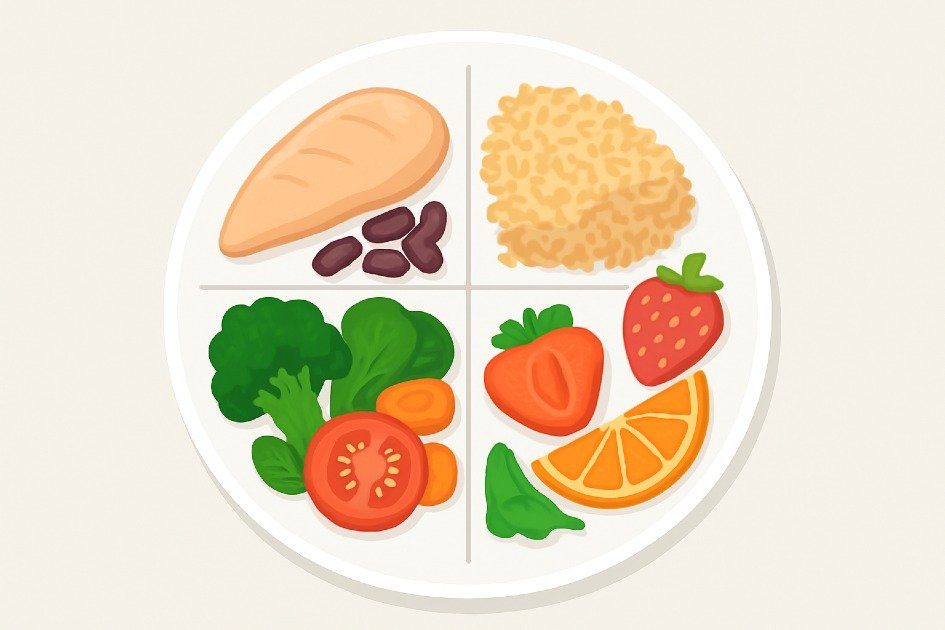
Building a Balanced Plate Every Day
A balanced plate is crucial for sustainable eating habits, promoting physical health and mental clarity, and can be vibrant, enjoyable, and manageable, challenging the belief that healthy eating is restrictive.
Fuel Your Body with Protein, Carbs, and Healthy Fats
Why it matters:
Protein, carbohydrates, and healthy fats are essential for energy, body function, and preventing fatigue, cravings, and nutrient deficiencies.
How to do it:
- Eat protein from lean meat, fish, eggs, beans, or plant-based foods. Try to fill a palm-sized portion at each meal.
- Focus on complex carbs such as quinoa, brown rice, and whole-grain bread to keep your energy steady and avoid refined carbs that quickly raise blood sugar.
- Add healthy fats like avocado, nuts, seeds, or olive oil to your meals. A small drizzle of olive oil on a salad gives your body important fatty acids.
- Try combining different proteins, carbs, and fats on your plate to make meals tasty and easy to stick with.
Fuel Your Body with Essential Vitamins and Minerals
Why it matters:
Vitamins and minerals are crucial for immunity, bone health, and energy production, but deficiencies can lead to fatigue, irritability, and increased illness risk.
How to do it:
- Add a rainbow of vegetables and fruits like spinach, carrots, berries, and bell peppers to your plate. Assorted colors bring different nutrients.
- Try adding pumpkin seeds or almonds to your meals.
- Try fortified foods or a supplement when your diet cannot provide enough nutrients.
I switch up my meals each week to get all the nutrients I need and keep eating for fun.
Portion Control Without Feeling Deprived
Why it matters:
Portion awareness is crucial for maintaining guilt-free eating habits, as healthy foods can cause weight gain or bloating when consumed in copious quantities.
How to do it:
- Fill half your plate with vegetables, one-quarter with protein, and one-quarter with carbs to keep meals balanced and healthy.
- Keep portions in check by using your hand. Use your palm for protein, your fist for carbs, and your thumb for fats.
- Slow down during meals and check if you are full. Eat for hunger, not out of stress or routine.
I often used smaller plates and bowls to help me eat less. Seeing less food made my portions feel full without cutting meals short.
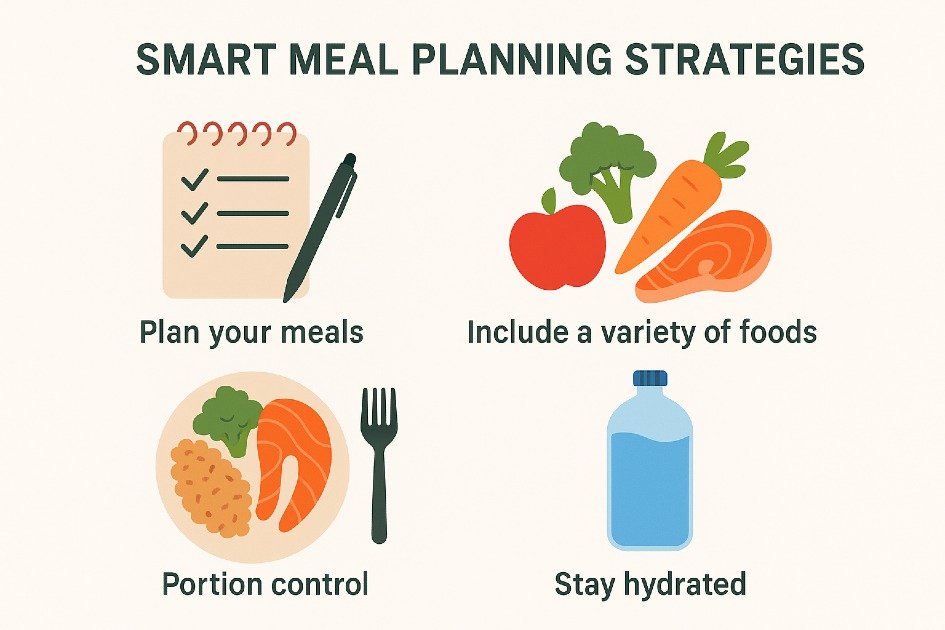
Plan Meals Wisely to Eat Healthy Every Day
Smart meal planning is crucial for sustainable eating habits, preventing impulsive choices, minimizing waste, and promoting a natural approach to healthy eating.
Plan Meals for the Whole Week
Why it matters:
Planning meals in advance helps individuals maintain healthy eating habits, save money, and feel more in control of their nutrition, reducing the likelihood of resorting to unhealthy options when hungry.
How to do it:
- Set aside 60 minutes each week to plan meals.
- Plan a full week of meals with breakfast, lunch, dinner, and healthy snacks each day.
- Eat a mix of foods every day by adding protein, whole grains, and vegetables to your meals.
- Plan your meals around your day to have more energy.
I use apps like MealPlannerPro to plan my meals easily and keep my menu on track.
Prep Healthy Meals Fast for Busy Days
Why it matters:
Meal prepping helps reduce decision fatigue due to busy schedules, promotes nutritious eating habits, and integrates healthy choices into daily life.
How to do it:
- Cook chicken, tofu, or beans in batches on weekends to save time and eat healthily all week.
- Cut your veggies ahead of time so salads, stir-fries, and snacks are quick and easy to make.
- Pack your meals into containers so you can grab them easily when you are on the go.
- Freeze leftovers so you will always have healthy meals ready on busy days.
- Turn one roasted chicken into many meals by using it in wraps, salads, and soups all week.
I prepare my overnight oats at night, so I save 10 minutes in the morning and stay on track with my healthy eating habits.
Avoiding Last-Minute Unhealthy Choices
Why it matters:
Impulse eating can hinder the long-term success of a healthy eating habit by allowing cravings to override healthy options.
How to do it:
- Keep healthy snacks where you can see them. Nuts, fruit, and yogurt make quick and smart choices.
- Keep ready-to-eat meals in your freezer or pantry for busy days.
- Set reminders for meals to stay on track and avoid overeating later.
Rotate Foods to Avoid Boredom
Why it matters:
Consuming consistent foods daily can lead to nutrient deficiencies and decrease motivation for healthy eating. Including variety in meals enhances meal enjoyment and provides a wider range of nutrients.
How to do it:
- Switch your protein each week by enjoying fish, chicken, beans, and lean beef for balanced nutrition.
- Choose seasonal fruits and veggies for meals because they are fresher, richer in nutrients, and cost less.
- Try herbs and spices to boost flavor and keep meals healthy without adding extra calories.
- Switch your grains by choosing quinoa, barley, brown rice, or whole wheat pasta for a healthier meal.
- Switch up your cooking by grilling, steaming, roasting, or sautéing to make every meal more exciting.
Fuel Your Body by Matching Meals to Energy
Why it matters:
Improper eating habits and imbalanced meals can lead to sluggishness and increased cravings, while organizing meals based on energy needs can improve eating habits and productivity.
How to do it:
- Start your day with a protein-packed breakfast to keep your energy strong and steady.
- Eat complex carbs before your workout to boost your energy and improve performance.
- Eat meals rich in fiber to stay full longer and cut down on extra snacks.
- Pay attention to your body and eat the amount that feels right for your hunger.
- Eat regular meals to stay full and stop yourself from overeating later.
I practice smart meals planning to eat better, stay flexible, and reduce stress. Small, steady changes help me build healthy habits and keep my energy strong for the long run.

Enjoy Every Bite Mindfully
Mindful eating improves body connection, weight maintenance, reduces stress, and enhances food enjoyment, requiring practical steps for lasting change.
Recognize Hunger vs. Emotional Eating
Why it matters:
Emotional eating, triggered by stress, boredom, or anxiety, can lead to overeating, guilt, and a negative relationship with food, necessitating self-awareness for improved eating habits.
How to do it:
- Pause before you eat and ask if you are hungry or just react to how you feel.
- Write down what you eat and how you feel for a week to spot healthy patterns.
- Take a few deep breaths or go for a short walk when cravings appear. It helps you tell real hunger from emotional eating.
I notice these cues and give myself a moment to choose my response instead of acting on impulse.
Tune Into Your Body’s Signals
Why it matters:
Many people overeat without recognizing their body’s fullness signals, but understanding these cues can help prevent overeating and increase awareness of genuine needs.
How to do it:
- Check your hunger from one being starving to ten being full before and after eating.
- Eat until you feel full and let your body enjoy the rest.
- After eating, I check if I ate for real hunger or just out of routine.
I pay attention to my body’s signals so I can adjust my portions easily and eat in a way that lasts.
Create a Distraction-Free Eating Environment
Why it matters:
Multitasking during meals, such as using a phone or watching TV, can negatively impact on the eating experience and lead to mindless eating.
How to do it:
- Focus on meals at a proper table and keep screens out of reach.
- Create a peaceful space by playing soft music, using gentle lighting, and keeping your area tidy.
- Savor each meal slowly, noticing the taste and texture in every bite.
I savor each bite, which helps me eat more intentionally and enjoy my meals while building lasting healthy habits.
Practice Gratitude for Your Food
Why it matters:
Acknowledging the effort and resources behind each meal fosters appreciation and reduces impulsive or emotional eating.
How to do it:
- Pause before eating and enjoy the food on your plate.
- Think about how food travels from the farm to your plate and the vitamins and minerals each bite gives your body.
- Think about how every meal fuels your body, boosts your energy, and helps you reach your health goals.
I savor each bite, making my meals more enjoyable and helping me eat mindfully every day.
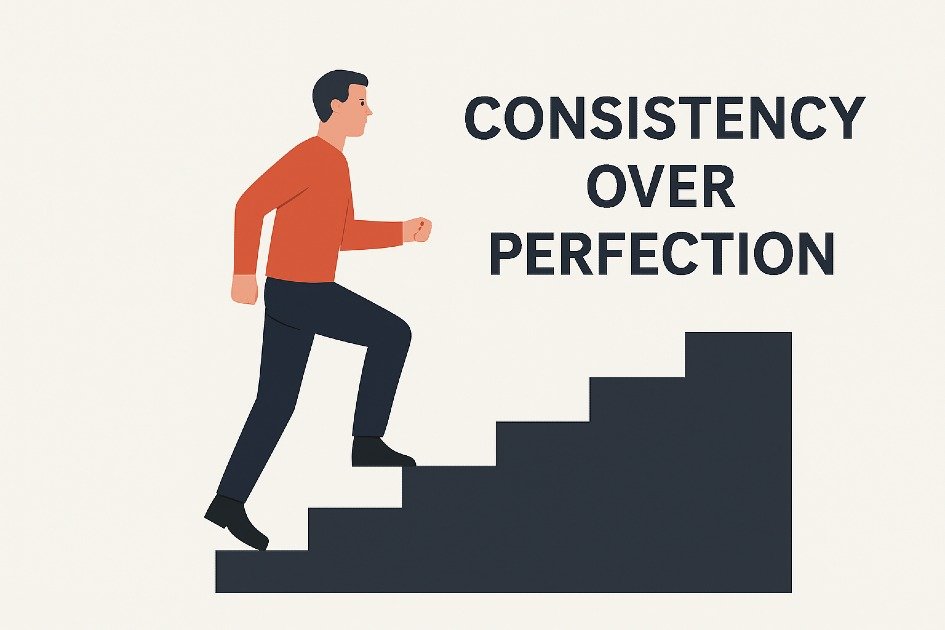
The Power of Consistency Over Perfection
Healthy eating habits are built on consistent small actions, not perfection, which can make healthy choices feel natural and less stressful.
Small Daily Choices Add Up Over Time
Why it matters:
Consistency leads to lasting change through incremental choices, while striving for perfection can lead to guilt and burnout, potentially reinforcing past habits.
How to do it:
- Try making one slight change each week by drinking eight glasses of water every day.
- Keep a journal or app to record progress and celebrate small wins.
- Notice small wins and reward yourself when you finish a week of mindful meals.
I know skipping a meal or enjoying a treat now and then will not undo my progress. What matters most is the healthy pattern I follow every day.
Avoiding the “All or Nothing” Trap
Why it matters:
The pursuit of perfect eating habits can lead to a mentality of failure, compromising long-term success and increasing food stress.
How to do it:
- Slip-ups happen and they do not control your overall eating habits.
- After a treat, jump back into your normal routine without skipping a day.
- Plan meals with balance and enjoy treats without feeling guilty.
- Be kind to yourself and focus on steady effort, not perfect results.
Celebrating Progress, Not Punishing Mistakes
Why it matters:
Negative self-talk can hinder progress by focusing on mistakes, complicating healthy eating habits, while positive reinforcement sustains motivation.
How to do it:
- Track your healthy eating progress with a simple visual chart.
- Treat yourself with small non-food rewards such as a soothing bath or fresh workout gear.
- Think about your weekly wins instead of your mistakes to strengthen your sense of success.
Integrating Consistency into Everyday Life
Why it matters:
To maintain good intentions, sustainable eating habits should be integrated into daily routines for effortless and habitual behavior.
How to do it:
- Try linking new habits to daily routines by having some fruit after lunch or stretching after dinner.
- Plan and cook meals ahead so healthy choices are always easy and ready.
- Try aiming for steady progress instead of expecting instant perfection.
- Set alerts like phone alarms, sticky notes, or apps to keep your daily habits on track.
Mindset Shifts That Support Consistency
Why it matters:
The brain prefers recognizing patterns, and a mindset focused on learning and growth can make consistency easier and less stressful.
How to do it:
- Try seeing eating challenges as experiments and ask yourself what changes if you add more vegetables this week.
- Focus on the rewards you will gain over time instead of quick pleasures.
- Try saying “I choose this” instead of “I cannot have this” to feel more in control of your choices.
- Focus on clear, doable affirmations such as saying I will add one healthy habit today.
I started adding a vegetable to each meal every week while juggling work and family. After three months, it became a habit and my energy, mood, and focus improved.

Hydration and Its Role in Healthy Eating
Proper hydration is crucial for long-term health and supporting diet, aiding in nutrient processing, appetite control, and energy levels.
Why Water is More Than Just a Beverage
Why it matters:
Dehydration can lead to overeating, but proper hydration supports digestion, enhances metabolism, and improves energy, focus, and physical performance.
How to do it:
- Drink a glass of water first thing in the morning to wake up your metabolism and prepare your body for food.
- Carry a reusable water bottle with you all day and take sips often.
- Try adding lemon, cucumber, or mint to water to make it taste fresh and skip sugary drinks.
- Check your urine color as an effortless way to stay hydrated; light yellow usually shows your body has enough water.
How to Stay Hydrated Throughout the Day
Why it matters:
Unknowingly, many people experience mild dehydration, impacting mood, concentration, and cravings. Maintaining hydration helps identify true hunger versus thirst, preventing overeating.
How to do it:
- Have a glass of water before meals to help control how much you eat.
- Add hydrating foods like watermelon, cucumber, and oranges to your meals to stay refreshed and healthy.
- Start with easy goals like drinking 8–10 cups of water each day and slowly drink more as your body adjusts.
- Track your water intake daily using apps or smart bottles to stay consistently hydrated.
How Hydration Supports Metabolism and Satiety
Why it matters:
Water plays a crucial role in body metabolism, breaking down fat and carbohydrates, and regulating appetite hormones helps prevent unnecessary snacking.
How to do it:
- Drink water with each meal and snack to help your body digest and absorb nutrients better.
- Swap sugary drinks for water or herbal tea to lower hidden sugar and boost health.
- When hunger strikes between meals, drink a full glass of water first because your body might need hydration.
- Drink enough water and pay attention while you eat to build lasting healthy habits.
I started drinking water regularly and noticed I snack less, digest better, and feel more alert. Keeping up this simple habit has made my healthy eating easier and more consistent.
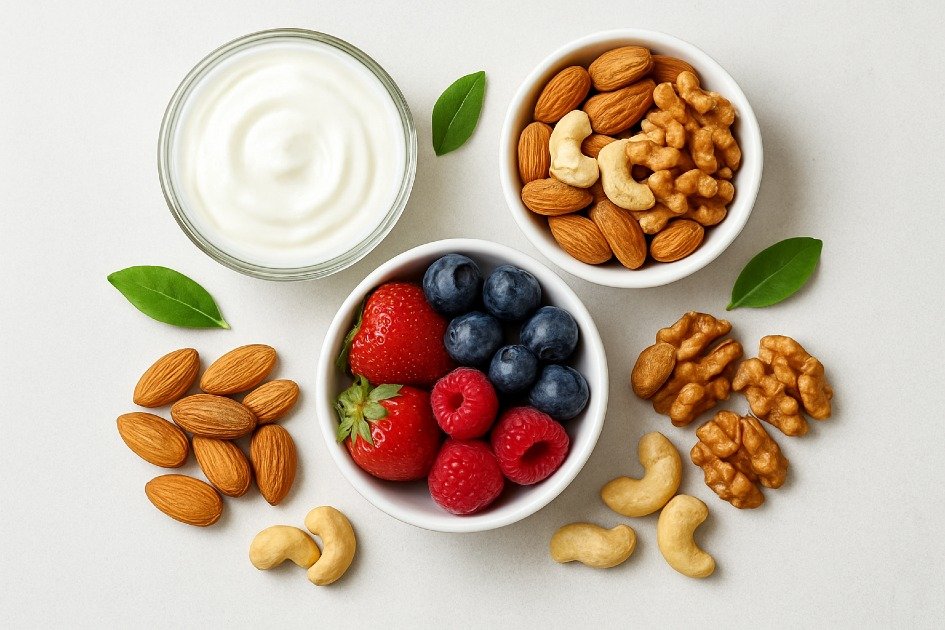
Smart Snacking for Long-Term Success
Snacking, despite its negative reputation, can enhance healthy eating habits by maintaining energy levels, preventing overeating, and improving overall nutrition.
Choosing Nutrient-Dense Snacks
Why it matters:
Nutrient-rich snacks provide essential vitamins, minerals, and macronutrients, strengthening eating habits, maintaining blood sugar, and reducing cravings for junk food.
How to do it:
- Choose snacks with protein and fiber to stay full longer.
- Choose whole foods such as nuts, seeds, Greek yogurt, and fresh fruits for better nutrition and lasting energy.
- Prepare small portions ahead so you reach for healthy snacks instead of whatever is nearby.
- Grab a healthy nut mix for a quick boost of energy anytime you are on the go.
Avoiding Hidden Sugars and Empty Calories
Why it matters:
Packaged snacks, despite their appearance, are often high in sugar, refined flour, or artificial additives, which can disrupt energy levels, weaken eating habits, and increase cravings for sweets.
How to do it:
- Pay close attention to nutrition labels and avoid products with added sugar, hydrogenated oils, or artificial flavors.
- Swap candy or cookies for fruit slices, homemade energy balls, or nut bars to satisfy sweet cravings in a healthier way.
- Carry your own healthy snacks so you skip unhealthy vending machine choices.
Grab Healthy Snacks on the Go
Why it matters:
Busy schedules often lead to unhealthy eating habits, so having convenient options helps maintain healthy eating habits without sacrificing time or energy.
How to do it:
- Carry healthy snacks in your bag such as trail mix, baby carrots, or small yogurt cups to stay fueled and avoid unhealthy choices.
- Prepare overnight oats or energy balls in advance so you can grab them quickly.
- Pack snacks in mason jars or small containers to control portions and avoid overeating.
Snack Smart to Boost Energy
Why it matters:
Smart snacking helps maintain stable blood sugar levels, strengthens eating habits, and prevents binge episodes by preventing extreme hunger and poor choices.
How to do it:
- Keep your energy steady by eating small snacks between meals when you start to feel tired.
- Try to eat every 3 to 4 hours to keep your energy steady and your body fueled.
- Pay attention to your hunger and eat when your body needs fuel instead of following strict rules.
- Drink water or herbal tea with your snacks to feel fuller and curb unnecessary eating.
Turn Snacking into a Healthy Daily Habit
Why it matters:
Snacking involves creating a lasting system, not just choosing the right food; structured snacking reinforces consistency, while mindless snacking can undo a strong eating habit.
How to do it:
- Place healthy snacks where you can see and reach them at home or work to make better choices easier.
- Switch up your choices to stay interested and make healthy habits fun.
- Notice how your energy and mood change and make small adjustments to stay at your best.
- Keep your snacks organized and your habits on track with a set of reusable containers.
I focus on smart snacking by picking nutritious foods, skipping empty calories, timing my snacks, and planning. Doing this regularly helps me eat better and stay healthy.

Stay on Track in Social Settings
Maintaining healthy eating habits in social settings requires strategy and mindfulness. Actionable steps can be taken to successfully implement changes.
Eating Out Without Guilt
Why it matters:
Understanding the difference between restaurant and home-cooked meals is crucial for long-term success in maintaining a healthy eating habit.
How to do it:
- Choosing your meal ahead stops you from picking unhealthy options on impulse.
- Ask for dressings on the side, trade fries for vegetables, or choose grilled instead of fried foods to make meals healthier.
- Eat slowly and enjoy each bite while paying attention to your hunger. This helps you stop before overeating.
- Eat more protein and fiber to feel full longer and keep your eating habits on track.
How to Manage Parties, Holidays, and Special Events
Why it matters:
Celebrations often involve food, and emotional triggers can disrupt eating habits, so it is crucial to recognize and manage these situations.
How to do it:
- Have a balanced meal before you go. Feeling a little full helps you avoid eating too much.
- Try using smaller plates so you can enjoy different foods without eating too much.
- Focus on your favorites and pick one or two foods you really enjoy instead of trying everything.
- Drink water between snacks to stop eating without thinking and keep your body refreshed.
Setting Boundaries While Still Enjoying Life
Why it matters:
Establishing boundaries is a healthy way to maintain an eating habit without causing discomfort or alienation to friends or family.
How to do it:
- Speak with confidence by saying things like “I’m keeping my healthy eating habit, so I’ll skip that dessert.”
- Bring a healthy dish to share so you always have a nutritious option.
- Spend time connecting with others through conversation, games, or activities instead of focusing on food.
- Enjoy treats with full attention, savoring every bite and feeling good about it.
Making Social Situations Predictable
Why it matters:
Social events’ uncertainty can disrupt even the strongest eating habits, but predictable strategies can reduce stress and prevent impulsive eating.
How to do it:
- Bring healthy snacks such as nuts or protein bars when traveling to skip fast food and stay energized.
- Check your surroundings when you arrive and pick healthier foods first.
- Have a small snack 30–60 minutes before the event to stay in control and avoid overeating.
- Enjoy treats without guilt and get back to healthy habits right away.
Leveraging Mindfulness in Group Settings
Why it matters:
Mindfulness can enhance self-awareness and control, preventing mindless eating in social situations, even for those with strong eating habits.
How to do it:
- Take a deep breath before eating, check if you are truly hungry, and think about what you are about to eat.
- Savor your food by paying attention to its taste, texture, and smell.
- Think back on your efforts, notice what helped and what did not, and plan how to do better next time.

How Cravings Link to Your Emotions
Recognizing cravings and emotional triggers is crucial for mastering long-term healthy eating habits, which can be achieved through practical teaching.
Why Cravings Happen and How to Respond
Why it matters:
Cravings are body and mind signals, ignoring them can lead to binge eating, guilt, and negative relationships with food. Understanding them helps maintain healthy eating habits.
How to do it:
- Write down your cravings, how you feel, and what you are doing at the time.
- Pause and ask yourself if you are hungry or just reacting to emotions.
- Have a glass of water, then pause a few minutes to refresh your body. Your body may be thirsty, not hungry.
- Swap sugary snacks for healthy picks like nuts, Greek yogurt, or fresh fruit to fuel your body right.
- Notice what emotions make you want to eat, like stress or boredom, and try healthy choices.
I use a mindful eating app to track my cravings and find better food choices.
Healthy Alternatives to Common Comfort Foods
Why it matters:
Replacing high-sugar or high-fat foods with healthier alternatives not only supports long-term eating habits without guilt but also reinforces positive behavior patterns.
How to do it:
- Choose natural sweets like dates, berries, or dark chocolate instead of sugary snacks.
- Swap fried snacks for air-popped popcorn or roasted chickpeas for a lighter, healthier crunch.
- Make your favorite snacks at home with real ingredients so you can manage how much sugar and fat you use.
- Keep your pantry filled with healthy foods so you do not grab processed snacks when cravings start.
Developing Emotional Resilience Around Food
Why it matters:
Emotional resilience helps manage cravings, maintain a consistent eating habit, and reduce stress-related overeating by enhancing the ability to resist food as a coping mechanism.
How to Do It:
- Try simple ways to ease stress like deep breathing, quiet meditation, or gentle yoga.
- Take five minutes before eating to notice how you feel inside.
- Choose healthy rewards like reading a book, taking a warm bath, or going for a walk.
I use guided meditation to help me stay calm and manage emotional eating.
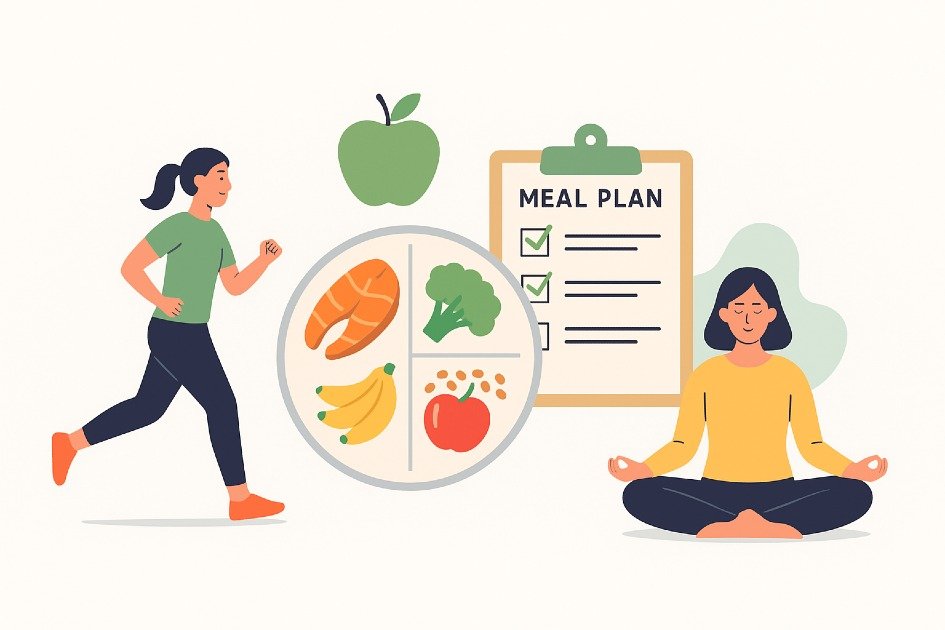
Lifestyle Habits That Support Healthy Eating
Adopting a healthy eating habit requires intentional lifestyle shifts that complement the right foods, resulting in long-term success in diet, energy levels, and overall well-being.
Prioritize Quality Sleep
Why it matters:
Poor sleep can lead to increased cravings for sugary, high-calorie foods, making it challenging to maintain healthy eating habits.
How to do it:
- Stick to a regular sleep routine.
- Wind down at night by reading, meditating, or enjoying soft music.
- Avoid screens before sleep
- Make your room cool, dark, and quiet to sleep better and wake up refreshed.
I notice that when I get an extra hour of sleep, I crave fewer processed snacks the next day.
Manage Stress Effectively
Why it matters:
Stress can lead to emotional eating and sabotage healthy eating habits, such as cortisol, a stress hormone, increases appetite and promotes fat storage, especially in the midsection.
How to do it:
- Try mindfulness by taking 5–10 minutes each day to breathe deeply and calm your nervous system.
- Gentle exercise like walking, yoga, or stretching lowers stress and boosts mood.
- Writing your feelings in a journal helps you stay in control and avoid eating when upset.
- Make time for hobbies and activities you enjoy recharging your mind and body.
I manage my stress a little each day, and it helps me skip late-night snacks.
Stay Physically Active
Why it matters:
Exercise boosts metabolism, improves mood, regulates appetite, and encourages healthier food choices by aligning energy with goals.
How to do it:
- Combine cardio with strength training to burn calories and build lean muscle.
- Try moving more every day by taking the stairs, walking while on calls, or standing while you work.
- Begin with 15–20 minutes each day and slowly build up your time as you go.
- Keep track of your workouts with a fitness tracker to stay consistent and motivated.
I see better results when I combine moderate exercise with mindful eating rather than doing just one.
Hydrate Strategically
Why it matters:
Proper hydration is crucial for sustaining a healthy eating habit, as it supports digestion, nutrient absorption, and overall energy, often leading to unnecessary snacking.
How to do it:
- Start your day with water to boost hydration and wake up your metabolism.
- Keep a water bottle within reach to remind yourself to drink often and stay hydrated all day.
- Enhance your water with lemon, cucumber, or mint to make drinking more enjoyable.
- Drink at least eight glasses of water a day and adjust for exercise or hot weather to stay properly hydrated.
I drink water and eat mindfully to feel full and avoid overeating.
Creating a Supportive Environment
Why it matters:
Your environment significantly influences your eating habits, with easy access to healthy foods promoting healthier choices and constant exposure to junk food hindering your goals.
How to do it:
- Keep your kitchen full of healthy foods like fresh fruits, vegetables, whole grains, and lean proteins.
- Hide unhealthy snacks so you are not tempted to eat them.
- Plan your meals in advance so that you can avoid grabbing fast food.
- Use notes, phone alerts, or visual signs to prompt healthy choices every day.
I keep my space full of healthy foods and positive choices to make eating well easier and stay on track.
Mindful Meal Scheduling
Why it matters:
Consistent meal patterns help maintain healthy eating habits by stabilizing blood sugar, preventing extreme hunger, and strengthening healthy eating habits.
How to do it:
- Stick to regular mealtimes to help your body’s internal clock work better and boost digestion.
- Eat breakfast every morning to jumpstart your metabolism and stop mid-morning hunger.
- Keep healthy snacks like nuts or yogurt on hand so you choose them instead of junk food.
- Pay attention to your hunger and eat only when your body truly needs food.
I plan my meals ahead, so I feel calm about food and easily keep my portions in check.
Recap: Build Habits for Lifelong Healthy Eating
The journey towards healthier eating habits is not linear but requires resilience and consistent application of strategies.
Harvard Health emphasizes the importance of consuming real food as the core of today’s nutrition message.
These habits should be sustainable, enjoyable, and deeply rewarding, allowing each meal and snack to reinforce the desired lifestyle.
Healthy eating habits also impact energy, mental clarity, and overall well-being. Combining these habits with mindful hydration, restorative sleep, and movement can maximize their impact.
Embrace this path with confidence, patience, and curiosity, reaffirming commitment every meal and allowing eating habits to elevate life.
Frequently Asked Questions
How can I stick to a healthy eating habit without feeling deprived?
Implementing a sustainable eating habit involves incorporating nutrient-dense foods like vegetables, proteins, and complex carbohydrates, gradually changing to whole grains and using meal-planning apps for convenience.
Are cheated meals acceptable in a structured eating habit?
Incorporate occasional indulgences into a structured eating habit by intentionally choosing cheat meals that satisfy cravings, pairing them with nutrient-dense accompaniments, and reducing feelings of restriction.
How can I make healthy eating affordable without sacrificing quality?
Healthy eating does not have to cost much when you make smart choices. Strategies include:
- Buy fruits and veggies in season to save money and get more nutrients.
- Buy grains, beans, and proteins in bulk to save money and cut down on waste.
- Use subscription services to get healthy, affordable meals delivered right to your door.
- Plan your weekly meals to stay on track and avoid buying things you do not need.
Can I eat out while maintaining healthy eating habits?
Strategic menu navigation, including grilled, steamed, or baked options, and portion awareness, can enhance overall eating habits without compromising social life.
What are the best strategies for breaking bad eating habits?
Changing old eating habits creates a new way of thinking and replacing them with better choices such as:
- Notice what makes you eat when you are not hungry, like stress or boredom.
- Choose better habits like sipping herbal tea, eating fresh fruit, or taking a brisk walk.
- Keep a food journal or use a habit-tracking app to stay accountable and see your progress.
How long does it take to solidify a new eating habit?
Establishing a new eating habit typically takes 21-66 days, requiring consistency, repetition, and celebrating incremental victories to maintain motivation and overcome minor setbacks.
How do I manage cravings without undermining my eating habit?
Cravings are normal, and you can enjoy them without letting them control your meals. Strategies include:
- Notice the difference between real hunger and emotional cravings.
- Keep snacks like nuts, fruit, or yogurt nearby for healthy choices anytime.
- Enjoy each bite and focus on your food to feel full of smaller portions.
What role do supplements play in healthy eating habits?
Supplements like vitamin D, omega-3 fatty acids, and magnesium can supplement a nutrient-rich diet, but should be consulted with a healthcare professional before use.
How do I stay motivated to maintain my eating habits long-term?
Reward yourself and focus on small, steady steps to make healthy eating stick. Techniques include:
- Track your progress by aiming to eat more vegetables and cut back on added sugars.
- Recognize small wins to boost your inner drive and stay motivated.
- Join groups or use coaching platforms to get social support and stay motivated.
Can an eating habit improve overall mental well-being?
A balanced diet rich in antioxidants, omega-3 fatty acids, and complex carbohydrates enhances neurotransmitter function, stabilizes mood, supports cognitive performance, emotional resilience, and long-term vitality.

